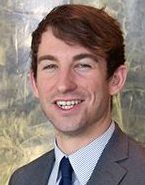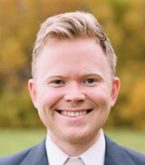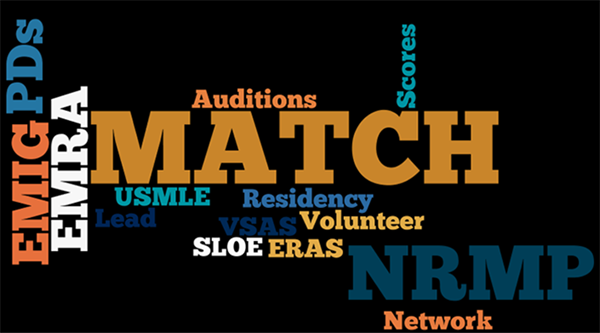Ross Christensen, DO, and Thomas Eales, DO, are recent graduates of Des Moines University, and both participated in the National Resident Matching Program (NRMP) main match as osteopathic applicants. Dr. Christensen is the former Osteopathic Coordinator for the EMRA Medical Student Council and the creator of EMRA Hangouts. He will be completing his residency at Maricopa Medical Center and plans to remain involved with the EMRA Education Committee. Dr. Eales is the former Editor for the EMRA Medical Student Council and student editor for EM Resident magazine. He will be completing his residency at Indiana University School of Medicine and will remain involved with the EMRA Research Committee.
Jon Pickos (JP): What is your opinion on getting involved early in medical school with Emergency Medicine? Are there some opportunities that stand out to residencies and Program Directors? Tommy Eales (TE): Getting involved in some kind of organized EM group early in medical school is a great way to show long-term interest in the specialty. It can also be a great way to develop leadership skills. Being an active member of your medical school's EM interest group (EMIG) is a good starting point in this regard. Try to seek out opportunities to be in charge of a community service project or to lead a scholarly activity like an EM journal club. If nothing like this exists at your school, take the initiative to create a new opportunity that interests you. Program faculty seem to gravitate toward applicants with a passion for something, so don't be afraid to branch out if you have interests outside of medicine. For example, if you enjoy cycling, starting a bike helmet donation program for kids would be a fun way to give back to the community while also incorporating an activity that you enjoy. It's much more meaningful to be fully committed to one or two projects or leadership roles than to be superficially involved with many, so be sure to also keep this in mind.
Tommy Eales (TE): Getting involved in some kind of organized EM group early in medical school is a great way to show long-term interest in the specialty. It can also be a great way to develop leadership skills. Being an active member of your medical school's EM interest group (EMIG) is a good starting point in this regard. Try to seek out opportunities to be in charge of a community service project or to lead a scholarly activity like an EM journal club. If nothing like this exists at your school, take the initiative to create a new opportunity that interests you. Program faculty seem to gravitate toward applicants with a passion for something, so don't be afraid to branch out if you have interests outside of medicine. For example, if you enjoy cycling, starting a bike helmet donation program for kids would be a fun way to give back to the community while also incorporating an activity that you enjoy. It's much more meaningful to be fully committed to one or two projects or leadership roles than to be superficially involved with many, so be sure to also keep this in mind.
 Ross Christensen (RC): Fully agree with what Tommy says. If you want to be a go-getter, your EMIG is the first place to look for involvement. There are also multiple national organizations (EMRA, for example) that you can join.
Ross Christensen (RC): Fully agree with what Tommy says. If you want to be a go-getter, your EMIG is the first place to look for involvement. There are also multiple national organizations (EMRA, for example) that you can join.
JP: What is the best approach to board exams for osteopathic medical students who want to match into an ACGME-accredited EM program?
TE: If osteopathic medical students intend to apply for ACGME-accredited residency programs, they absolutely need to take the USMLE. Failure to do this will be seen as a red flag in the residency application and will place the candidate at high risk for not securing a position. I recommend taking both USMLE Step 1 and Step 2 CK, as these scores are mandatory for consideration at most programs. It is simply unfair to expect residency programs to be able to assess and reliably compare a candidate's baseline medical knowledge and test-taking ability when they do not submit USMLE scores. Many osteopathic medical students have told me their medical schools have actively discouraged them from taking the USMLE. While I can only speculate as to why this might be, I'm a strong advocate for taking the USMLE and will attest that it opened many doors for my own career. EM has become a competitive specialty, and osteopathic candidates must realize that being able to perform to a minimum standard on the USMLE is an essential screening tool for nearly every ACGME-accredited residency program. While taking two sets of board examinations is far from ideal, this is the standard practice right now for osteopathic EM applicants and this is what I would recommend to any student who is serious about pursuing a position in an ACGME-accredited EM program.
RC: Osteopathic applicants already face barriers in applying to ACGME-accredited residency programs. One of the best ways to remove one of these is by taking USMLE Step 1 and Step 2 CK. This allows programs to compare apples to apples and will make you a more competitive applicant. From personal experience, I did well on the COMLEX and no one asked or mentioned my COMLEX scores, but multiple people mentioned me taking both parts of the USMLE contributed to the strength of my application.
JP: Is there a good way to approach selecting locations for audition/away rotations? Any advice on how to find these programs?
TE: The best way to approach the application process for audition rotations is to research programs of interest before the applications open. The ultimate goal of an audition rotation is to earn a Standardized Letter of Evaluation (SLOE), and these special letters will mean more to programs that are geographically closer to the letter-writing program. So, if you go to medical school in the Midwest but would like to do residency in the Northeast, it would be very helpful to complete an audition rotation in the Northeast. Most of the programs will use the Visiting Student Application Service (VSAS) to manage this process, but many continue to use an internal application. Almost every program maintains a specific page on their website that is dedicated to the audition rotation application process, so this should be the first stop in the research process. It is perfectly appropriate to email the program coordinator if it is not obvious on the program's website as to how visiting students should apply. EMRA Match is a great tool that can be used to identify programs in a particular region of interest, and it even links directly to the program website!
RC: First sit down and think about what is most important to you in a residency. Is it geography? Community vs. county vs. academic program? 3 vs. 4 years? Figure out what you are looking for and then start narrowing down based off of your list. EMRA Match is a great way to visualize where programs are as well as gather additional information. I would suggest having a good idea where you want to go the first part of third year, as around December/January some programs start taking applications (most wait until March/April/May) and you don't want to be caught submitting late. Start checking out VSAS as soon as you can, as programs will list different requirements that you will need to fill before you can submit your application.
JP: When is the best time to start reaching out and looking for audition/away rotations?
TE: While the most common time to start browsing VSAS for available audition positions sometime is in the late winter/early spring of the 3rd year, some programs that fill audition spots outside of VSAS may start accepting applications as early as November. It is best to visit the program websites as early as possible, as they will have the most current information regarding the audition rotation application process.
RC: Agree with Tommy!
JP: Any advice on preparation for audition rotations? Concise resources, phone apps, etc.?
TE: Mandatory reading for every EM-bound medical student is the Clerkship Directors in Emergency Medicine (CDEM) website. This resource provides year-specific curricula that are designed to prepare students for the audition rotation. My best advice is to begin utilizing this resource early in the 3rd year. It is broken into chief complaint and topic, and it serves as an excellent guide to further reading on EM topics on either UpToDate or an EM text like Tintinalli. For students that have less time to prepare, I recommend the book "The Chief Complaint" by Chris Feier, MD, PharmD. This book is an excellent bedside resource that provides an algorithmic approach to many of the most common chief complaints in the ED. It also provides literature citations for further reading.
RC: Agree with Tommy, the CDEM website was really good and has the basics that you need to know. I also use an app called palmEM that I found very helpful. The EMRA Antibiotic Guide is also a nifty resource to have and makes it easy to figure out what antibiotic and what dose. I would caution against getting too many resources as it makes it easy to get bogged down. Pick a few and stick with them.
JP: Do you have any pearls on how to shine and get strong SLOE's at a residency that may be less familiar with your medical school?
TE: The most important piece for doing well on an audition is to be an enjoyable co-worker in the ED. While it is very important to learn how to develop a comprehensive differential and perform a focused presentation to an attending, it is just as important to be respectful and helpful to everyone in the ED. The chaotic nature of the ED is such that every member of the team plays an important role in taking care of patients. Medical students who are friendly, approachable, and willing to help out with any task (no matter how small) will get along well with the nurses, techs, and clerks. If you are well-liked by the ED staff, you will likely be asked to come back. My experience has been that people tend to care quite a lot about a student's ability to be a courteous and hard-working part of the team, and they care much less about the reputation of student's medical school.
RC: Residencies get flooded with applications. By this point, most everyone can jump through the hoops and do well enough during preclinical years and board exams. From SLOEs programs want to see if people like working with you and if you are a team player. Yes, it's important to have a basic knowledge of common EM complaints, but no one expects you to manage an MI all by yourself. Your attendings and residents will be impressed if you can lay out a solid H&P and plan, but will be even more so if you are bringing blankets and water to your patient and checking up on labs and consults. Be a team player, be excited to learn, and don't be rude. Those three things will get you far.
JP: What were the biggest things that drew you to Emergency Medicine over other specialties?
TE: The biggest thing that drew me to EM was the breadth and scope of the specialty. It is truly the only field in which one doctor can deliver a baby, intubate an asthmatic child, diagnose and treat a deadly cardiac arrhythmia, and stabilize a crashing trauma patient all in the same day. I gravitated toward the emergency cases in every other specialty during my 3rd year, so EM was a natural choice for me. There is a nice mixture of medical knowledge and procedures in the ED, so it is a great specialty for those who like to both diagnose and treat. EM also has a unique psychosocial element to it that is not found in many other specialties. You will work with the patients who slip through the cracks of our healthcare system, and in many ways you will become the safety net doctor for your community. At the end of your training, you will be one of the few doctors in the hospital who is trained to help any patient, any time, and anywhere.
RC: You get to do everything! I've worked a lot of jobs in my life, and most of them you do the same thing today as you did yesterday and you'll be doing the exact same thing three months from now. With EM, you have no idea if your first patient will be a bug bite or a stroke. I also love the people I've met in EM; it's tough to find a cooler group. Plus, EM seems to always have the best stories.
JP: Anything you know now that you wish you had known before going through the audition and matching process in EM?
TE: I wish that someone would have told me how much fun it is to be an auditioning 4th year student! The audition and application process seems daunting at the end of 3rd year, but my audition rotations were far and away my favorite months of medical school. You will be taking care of sick patients as the primary provider, and that feeling is both terrifying and exhilarating at the same time. You will see new pathology, perform new procedures, and meet incredible people who will become good friends. You will work hard, and you will finish your rotation feeling very excited about your career choice.
RC: Find a mentor early on that you can ask for advice and whom you can run your application by. Find someone who can honestly go through your application and help you identify any red or yellow flags that you may have. They can also help you identify what programs to apply to. I would also suggest that you research as many programs as you can before you apply to them, so you can see what programs you would be really interested in. Finally, if you're able to go to any national or regional meetings hosted by emergency medicine organizations, it can be a great place to network for someone going through the match cycle.
Note: EMRA hosts multiple events for medical students in conjunction with ACEP Scientific Assembly. EMRA student members can attend for free; please sign up for these free preconference workshops through the ACEP17 registration portal. In 2017, the EMRA Medical Student Forum and the EMRA Residency Program Fair take place Saturday, Oct. 28.



